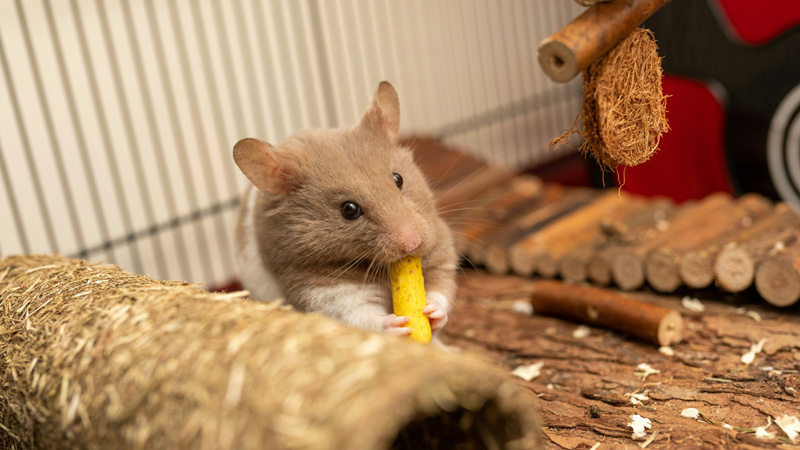Can Hamsters Spread Diseases to Humans?

Photo by Andy Holmes on Unsplash
Hamsters are popular pets known for their cute and furry appearance. They are relatively low maintenance and can bring a lot of joy to their owners. However, as with any pet, there are certain considerations when it comes to potential health risks. One question that often arises is whether hamsters can spread diseases to humans.
In this article, we will explore the topic of zoonotic diseases (diseases that can be transmitted from animals to humans) and the potential risks associated with hamsters.
Zoonotic Diseases
Zoonotic diseases are infectious diseases that can be transmitted between animals and humans. They can be caused by various microorganisms, including viruses, bacteria, fungi, and parasites. Zoonotic diseases can be transmitted through direct contact with infected animals or their bodily fluids, as well as indirect contact through contaminated objects or environments.
It's important to note that the risk of zoonotic disease transmission from pets to humans is generally low, and good hygiene practices can greatly reduce this risk. However, it's essential to be aware of the potential health concerns associated with pets and take appropriate precautions, including proper hand hygiene and general cleanliness.
Specific Diseases of Concern
While the risk of zoonotic disease transmission from hamsters to humans is generally low, there are a few specific diseases that have been associated with hamsters. Let's take a closer look at these diseases and what precautions you can take to minimize the risk.
1. Lymphocytic Choriomeningitis (LCM)
Lymphocytic choriomeningitis (LCM) is a viral disease that can be transmitted from hamsters to humans. The virus is typically found in wild mice and can be present in the urine, feces, saliva, and nasal secretions of infected rodents, including hamsters.
Symptoms of LCM in humans can range from mild to severe and may include fever, headache, muscle aches, fatigue, and in some cases, meningitis or encephalitis. While LCM is relatively rare, those with compromised immune systems, pregnant women, and young children may be at a higher risk of developing severe symptoms if infected.
To minimize the risk of LCM transmission, it's important to practice good hygiene when handling hamsters or cleaning their cages. Avoid direct contact with hamster urine, feces, or saliva, and wash your hands thoroughly with soap and water after handling hamsters or cleaning their habitat.
2. Salmonella
Salmonella is a bacterial infection that can be transmitted from a variety of animals, including hamsters, to humans. Hamsters can carry Salmonella bacteria in their intestines without showing any symptoms. Humans can become infected when they come into contact with contaminated feces, bedding, or food.
Symptoms of Salmonella infection in humans can include diarrhea, abdominal pain, fever, and vomiting. Most healthy individuals recover without treatment, but severe cases may require medical attention. Those with weakened immune systems, young children, and the elderly are at a higher risk of developing severe symptoms.
To minimize the risk of Salmonella transmission, it's important to handle hamsters and their habitat with care. Avoid contact with hamster feces and urine, and wash your hands thoroughly after handling your pet or cleaning their cage. It's also important to clean their habitat regularly and avoid cross-contamination by using separate cleaning tools and not placing hamster items near food preparation areas.
3. Allergies and Asthma
While not infectious diseases, it's worth mentioning that some individuals may develop allergies or asthma symptoms due to their interaction with hamsters. Hamster fur, dander, and bedding can contain allergens that can trigger allergic reactions or exacerbate existing respiratory conditions.
Symptoms of pet allergies can include sneezing, itching, wheezing, and difficulty breathing. If you or someone in your household experiences these symptoms when in contact with a hamster, it may be advisable to consult with a healthcare professional for proper diagnosis and management.
Preventive Measures
To minimize the risk of disease transmission from hamsters to humans, here are some preventive measures you can take:
Hand Hygiene: Wash your hands thoroughly with soap and water after handling your hamster or cleaning their habitat. This is especially important before eating or preparing food.
Cage Cleaning: Clean your hamster's cage regularly, following appropriate hygiene practices. Avoid inhaling dust or particles from the bedding, and wear gloves when handling soiled bedding.
Avoid Face-to-Face Contact: Avoid direct contact between your face and your hamster, as this can reduce the risk of potential disease transmission.
Supervise Interactions: Supervise interactions between young children and hamsters to ensure proper handling and minimize the risk of accidental exposure.
Proper Food Handling: Avoid cross-contamination between hamster-related items and food preparation areas. Store hamster food securely and handle it separately from human food.
Regular Veterinary Care: Ensure your hamster receives regular veterinary check-ups to maintain their health and minimize the risk of potential diseases.
Reducing Stress: Maintain a clean and comfortable environment for your hamster, as reducing stress levels can contribute to overall health and well-being.
Remember, while the risk of disease transmission from hamsters to humans is generally low, it's important to remain vigilant and take appropriate precautions to protect both yourself and your pet. By following good hygiene practices and taking preventative measures, you can enjoy the companionship of your hamster with minimal health risks.
Final Thoughts
While hamsters can sometimes carry and transmit diseases to humans, the risk is generally low. By practicing good hygiene, maintaining a clean environment, and being aware of potential health concerns, you can greatly reduce the risk of disease transmission. If you have any concerns or questions about the health of your hamster or potential risks, it's always a good idea to consult with a veterinarian for guidance and advice. With proper care and attention, you can enjoy a healthy and fulfilling relationship with your hamster while minimizing any potential health risks.
You May Also Like
 Pet HamsterIs a Hamster a Type of Rat? Debunking the Myth
Pet HamsterIs a Hamster a Type of Rat? Debunking the Myth Pet HamsterWhat is the Most Common Type of Hamster?
Pet HamsterWhat is the Most Common Type of Hamster? Pet HamsterHamsters vs. Mice: What Is the Difference?
Pet HamsterHamsters vs. Mice: What Is the Difference? Pet HamsterWhich Type of Hamster is the Friendliest?
Pet HamsterWhich Type of Hamster is the Friendliest? Pet HamsterIs It Better to Have 2 Hamsters or 1?
Pet HamsterIs It Better to Have 2 Hamsters or 1? Pet RatsExploring the 7 Different Types of Pet Rats
Pet RatsExploring the 7 Different Types of Pet Rats